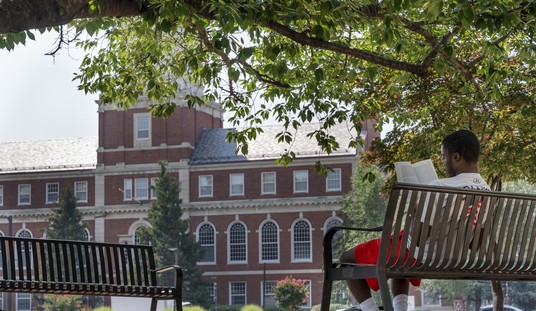A group of 620 academics signed an open letter to the Linguistic Society of America arguing that the group should distance itself from academic and author Steven Pinker. The reasons? Most of the offenses listed are rather vague references to tweets from as far back as 2014, but the gist of the letter is that Pinker isn’t sufficiently supportive of Black Lives Matter. The letter claims the signatories don’t want to “cancel” Dr. Pinker but then immediately admits that, actually, many of the signatories may believe that:
We want to note here that we have no desire to judge Dr. Pinker’s actions in moral terms, or claim to know what his aims are. Nor do we seek to “cancel” Dr. Pinker, or to bar him from participating in the linguistics and LSA communities (though many of our signatories may well believe that doing so would be the right course of action). We do, however, believe that the examples introduced above establish that Dr. Pinker’s public actions constitute a pattern of downplaying the very real violence of systemic racism and sexism, and, moreover, a pattern that is not above deceitfulness, misrepresentation, or the employment of dogwhistles.
The good news is that the LSA has already rejected this effort to punish Pinker saying, “It is not the mission of the society to control the opinions of its members, nor their expression.” Good for them.
Today the New York Times took a look at the controversy and, while the piece studiously avoids the phrase “cancel culture,” it was not very sympathetic to the signatories or their goals, perhaps in part because one of the things Pinker is faulted for doing is tweeting a link to an article published by the NY Times:
Reached at his home on Cape Cod, Professor Pinker, 65, noted that as a tenured faculty member and established author, he could weather the campaign against him. But he said it could chill junior faculty who hold views counter to prevailing intellectual currents…
He described his critics as “speech police” who “have trolled through my writings to find offensive lines and adjectives.”
The letter against him focuses mainly on his activity on Twitter, where he has some 600,000 followers. It points to his 2015 tweet of an article from The Upshot, the data and analysis-focused team at The New York Times, which suggested that the high number of police shootings of Black people may not have been caused by racial bias of individual police officers, but rather by the larger structural and economic realities that result in the police having disproportionately high numbers of encounters with Black residents…
The linguists’ letter noted that the article made plain that police killings are a racial problem, and accused Professor Pinker of making “dishonest claims in order to obfuscate the role of systemic racism in police violence.”
But the article also suggested that, because every encounter with the police carries danger of escalation, any racial group interacting with the police frequently risked becoming victims of police violence, due to poorly trained officers, armed suspects or overreaction. That appeared to be the point of Professor Pinker’s tweet.
In short, the linguists who wrote the letter are misrepresenting Pinker’s statements to make him look as bad as possible. So who did write the letter? When the Times contacted various signatories of the letter, no one seemed willing to identify the author:
The origin of the letter remains a mystery. Of 10 signers contacted by The Times, only one hinted that she knew the identity of the authors. Many of the linguists proved shy about talking, and since the letter first surfaced on Twitter on July 3, several prominent linguists have said their names had been included without their knowledge.
All of this comes directly from the cancel culture stylebook. Dig up a few old tweets or statements, put them in the worst possible light. Publicize them and demand the author be publicly scolded and shunned.
Academic John McWhorter, who is no fan of identity politics or cancel culture, told the Times, “We’re in this moment that’s like a collective mic drop, and civility and common sense go out the window. It’s enough to cry racism or sexism, and that’s that.” He’s exactly right. The unnamed authors of the open letter might as well have just called Pinker an enemy of the people. That’s all the letter amounts to anyway.
Writing about the same controversy at City Journal, Aaron Brown said the open letter reminded him of his father’s brush with McCarthyism many decades ago:
The 536 signatories to the Pinker letter are public. I have little doubt that Pinker will survive this episode, and in any event he doesn’t need my defense. My concern is for the letter’s authors.
Like my father’s witnesses, they will have to live with their words; but unlike my father’s witnesses, the world will know them. When respect for due process and rational discussion return to the public sphere, and this letter is universally seen as a resurrection of McCarthy’s tactics, the authors will be indelibly marked by it. It could cause a schism in the field of linguistics, just as Hollywood was divided for decades between those who named names and those who had been blacklisted.
I wish I was as confident as Brown is that one day soon we’ll look back on left-wing cancel culture as another failed McCarthyism, but the unpleasant fact remains that in some places around the world the cultural revolutionaries win. At the moment, they seem to be winning a lot of battles here even if Pinker isn’t one of them.
And because the cancel culture left lost this round, Pinker will cited as another example that cancel culture doesn’t really exist. But that’s a dodge and a lie. Like Dave Chappelle and J.K. Rowling, Pinker is too well known and liked to be brought down by this kind of attack. But as I’ve argued before, that shouldn’t matter. The will to cancel him is there. The fact that the mob isn’t yet big enough to pull it off in this case shouldn’t be to their credit but to the credit of those of us who still dare to oppose them.








Join the conversation as a VIP Member